The global aircraft fuel systems market size was valued at $8.5 billion in 2022, and is projected to reach $15.7 billion by 2032, growing at a CAGR of 6.5% from 2023 to 2032.
An aircraft fuel system plays a crucial role in the loading, storage, management, and delivery of fuel to the propulsion system, which includes the engine(s), of an aircraft. Aircraft fuel systems encompass a wide range of components, including fuel tanks, pumps, valves, filters, piping, gauges, and inerting systems. These components work together to store fuel, transfer it from the tanks to the engines, monitor fuel quantity and quality, and protect against potential hazards such as fuel leakage and vapor explosions.
Report Key Highlighters:
- The aircraft fuel systems study covers 15+ countries. The research includes a segment analysis of each country in terms of both value ($million) for the projected period 2023-2032.
- The study integrated high-quality data, professional opinions and analysis, and critical independent perspectives. The research approach is intended to provide a balanced view of global markets and to assist stakeholders in making educated decisions in order to achieve their most ambitious growth objectives.
- Over 3,700 product literatures, annual reports, industry statements, and other comparable materials from major industry participants were reviewed to gain a better understanding of the market.
- Key players profiled in the aircraft fuel systems industry report include Eaton Corporation, GKN Aerospace Services Limited., Honeywell International Inc., Parker Hannifin Corporation, Collins Aerospace, Safran S.A., Triumph Group, Inc., Crane Company, Woodward, Inc., and Secondo Mona SpA. The leading companies adopt strategies such as contract, agreement, acquisition, expansion, and collaboration to strengthen their market position.
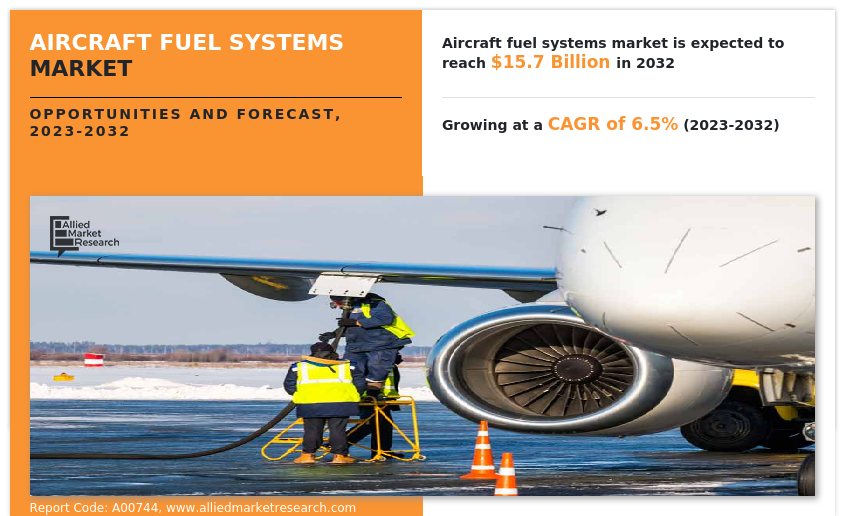
The aircraft fuel systems market is segmented into Application, Engine Type, Component and Technology.
Factors such as the increase in demand for sustainable aviation fuel (SAF) and the government support for development of new aviation fuel system for fuel-efficient aircraft drive the growth of the aircraft fuel systems market. In addition, the increase in aircraft deliveries propels the market growth. However, the challenges associated with incorporating advanced fuel systems into traditional airplanes hinder growth of the market.
Further, the rise in adoption of hydrogen aircraft fuel system and surge in next-generation aircraft demand provide remarkable growth opportunities for players operating in the market. The aircraft fuel systems market is segmented into application, technology, engine type, component, and region. On the basis of application, it is segregated into military, commercial, and UAV. On the basis of technology, it is fragmented into gravity feed, fuel feed, and fuel injection. On the basis of engine type, the market is categorized into UAV engine, turbojet engine, turbofan engine, and turboprop engine. On the basis of component, the market is categorized into piping, pump, valve, gauges, inerting systems, and filters. On the basis of region, the market is analyzed across North America, Europe, Asia-Pacific, and LAMEA.
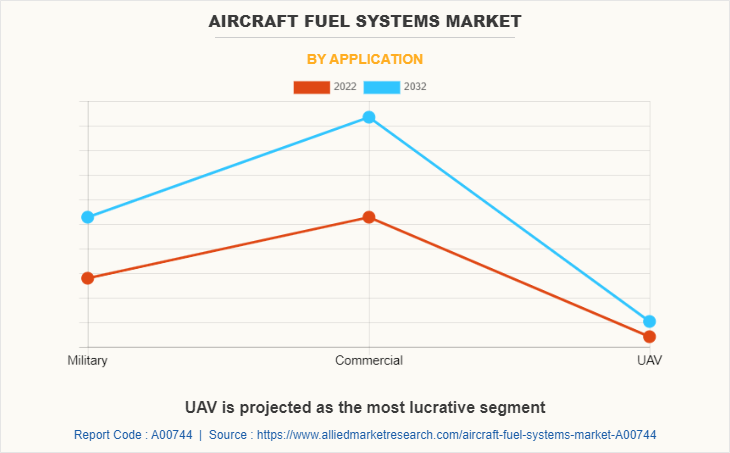
The Asia-Pacific region presents a diverse landscape for the aircraft fuel systems market. The Asia-Pacific region is densely populated and the number of people who now have enough money to travel by air is growing. This is the driving force for major airlines in the region. In fact, the majority of aircraft production is expected to be in Asia. However, challenges such as substandard infrastructure, regulatory inconsistencies and environmental concerns may impact the growth of airlines. On the other hand, the availability of skilled labor, supportive government policies and growth in productivity are considered as the major factors that may accelerate the market for aviation fuel systems in the Asia-Pacific region.
Key players profiled in the report include Eaton Corporation, GKN Aerospace Services Limited., Honeywell International Inc., Parker Hannifin Corporation, Collins Aerospace, Safran S.A., Triumph Group, Inc., Crane Company, Woodward, Inc., and Secondo Mona SpA. The leading companies adopt strategies such as contract, agreement, acquisition, expansion, and collaboration to strengthen their market position.
Increase in demand for sustainable aviation fuel (SAF)
Sustainable aviation fuel (SAF) is a liquid fuel presently employed in commercial aviation, capable of reducing CO2 emissions by up to 80%. It may be derived from various sources, such as waste oil and fats, green and municipal waste, and non-food crops. SAF offers environmental benefits by reducing greenhouse gas emissions and has gained regulatory and industry support, creating a favorable market environment. The participation of airlines in voluntary offsetting programs further drives the demand for SAF. Technological advancements and improvements in production processes are making SAF commercially viable, making way for aircraft fuel systems providers to support their integration into existing fleets.
In addition, governments and aviation regulatory bodies around the globe are implementing policies and initiatives to promote the use of SAF. For instance, in December 2022, the UK moved closer to its objective of attaining net zero carbon emissions and supporting sustainable aviation fuel (SAF) by granting funding from the $205 million (£165 million) Advanced Fuels Fund to five projects.
Collectively, these initiatives are projected to generate more than 300,000 tons of SAF annually, resulting in a reduction of approximately 200,000 tons of CO2 emissions per year. Moreover, in May 2023, India announced that it projected to mandate domestic aircraft to use 1% sustainable aviation fuel (SAF) by 2025 to reduce emissions from the sector. Aircraft fuel systems may adapt their systems to accommodate the unique properties and requirements of SAF. This includes designing fuel systems that may handle different types of SAF, ensuring compatibility, and optimizing performance and safety.
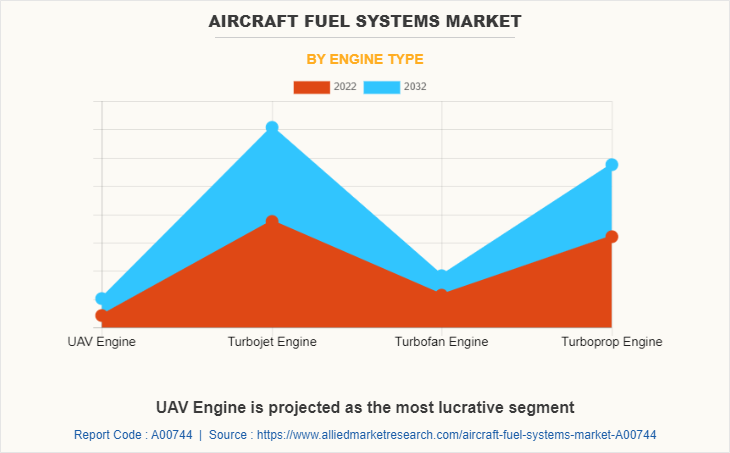
Moreover, existing aircraft fleets may be retrofitted with fuel systems that are compatible with SAF. For instance, in March 2023, a popular aircraft, A321neo from Airbus commenced a flight utilizing 100% sustainable aviation fuel (SAF). This particular A321neo marks the first Airbus single-aisle aircraft to undergo testing with SAF exclusively in both engines. Moreover, in June 2022, ATR, a manufacturer of regional aircraft, joined forces with Braathens Regional Airlines, a Swedish airline, and sustainable aviation fuel (SAF) provider Neste to facilitate the historic first-ever test flight of a commercial aircraft powered by 100% SAF.
Neste MY Sustainable Aviation Fuel, when used in its pure form, has the potential to reduce greenhouse gas emissions by up to 80% throughout its life cycle compared to the use of fossil jet fuel. These developments allow airlines to transition to sustainable aviation fuel without significant investments in new aircraft. Thus, owing to this, retrofitting and upgrading fuel systems enable the use of SAF in existing aircraft fleets, which is expected to fuel the demand for the aircraft fuel system market.
Increase in aircraft deliveries
Rise in air traffic across the globe, fleet modernization program to include efficient fuel systems, and gradual increase in pace of fuel system adoption by manufacturing companies support business opportunities within the aircraft fuel systems market. Moreover, Airbus accomplished the delivery of 661 commercial aircraft to 84 unique customers in 2022, along with recording a notable total of 1,078 gross new orders. The majority of Airbus aircraft deliveries in 2022 were made to IndiGo Airlines. A total of 49 aircraft were supplied, consisting of 23 A320-300Ns and 26 A321-200NXs. In addition, in December 2022, Boeing successfully delivered a total of 69 commercial jets, which comprised 53 737 MAX aircraft. This contributed to the overall annual deliveries for 2022 reaching a significant milestone of 480 airplanes.
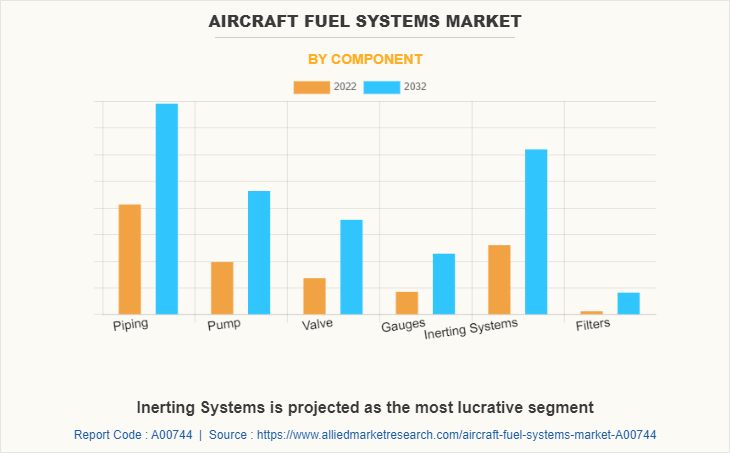
The companies are optimizing their manufacturing processes and ramping up their production capacities. For instance, in March 2022, Boeing delivered 41 aircraft, including three 767s, one 777F, and 37 737s (35 MAX/ 2 NG). The official production pace of the 737 program is now 27 per month, up from 19 at the end of October 2021, and it is almost at the short-term goal of 31 per month. As airlines expand their fleets to cater to increasing passenger traffic and route networks, the need for reliable, efficient, and advanced fuel systems becomes paramount. Companies that produce and supply aircraft fuel systems have the potential to gain advantages from this increased demand, which can lead to profitable opportunities for the expansion of the aircraft fuel systems market value.
Challenges associated with incorporating advanced fuel systems into traditional airplanes
Retrofitting existing aircraft designs and infrastructure to accommodate new technology is a complex and time-consuming process, requiring careful customization. Challenges include space constraints, maintaining structural integrity, and ensuring system compatibility. Integrating advanced fuel systems may require modifications to ground infrastructure, such as fueling facilities and maintenance procedures. Seamless integration with existing operational infrastructure may be logistically challenging, and disruptions or delays in the transition may impact airline efficiency and profitability.Compatibility limitations pose a hurdle to the widespread adoption of advanced fuel systems. Different aircraft models and generations may not be seamlessly compatible, hindering market penetration. Addressing these challenges requires innovation, collaboration, and ongoing research and development efforts to streamline integration and ensure cost-effective implementation. It is important to overcome these limitations to widely adopt and expand the aircraft fuel systems market.
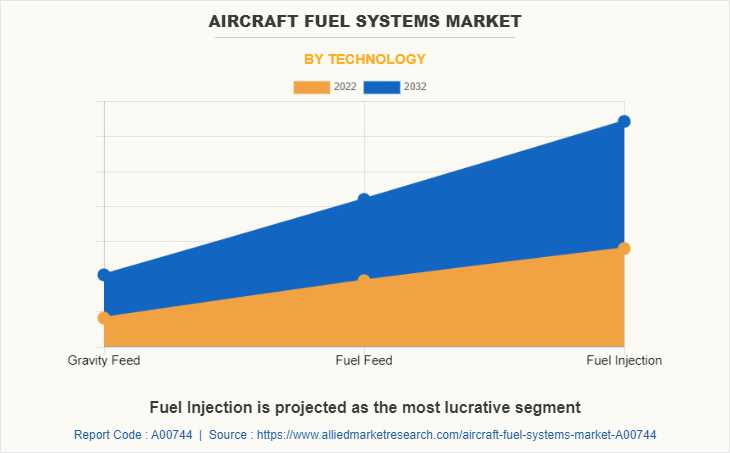
Rise in adoption of hydrogen aircraft fuel system
The aircraft industry is constantly seeking innovative and sustainable solutions to reduce greenhouse gas emissions and mitigate the environmental impact of aviation. Hydrogen fuel systems offer environmental benefits by reducing carbon emissions and minimizing pollutants. They also offer enhanced fuel efficiency due to the higher energy density of hydrogen. Advancements in hydrogen storage, distribution, and safety technologies are making hydrogen fuel systems more viable and reliable.
Moreover, strategic partnerships and collaborations between industry stakeholders are accelerating the innovation and commercialization of hydrogen-based aviation technologies. For instance, in September 2022, Fabrum, a company based in New Zealand that specializes in transitioning to zero-emissions solutions, collaborated with Filton Systems Engineering (FSE), a British engineering consultancy, and GKN Aerospace. Their collective objective is to facilitate the transition of aviation to hydrogen-powered flights by providing comprehensive technology for hydrogen fuel systems. This collaboration focused on aerospace fuel systems and design of various systems related to fuel, air, hydraulic, fuel tank storage, and hydrogen fuel systems. Hence, the adoption of hydrogen as a fuel source for aircraft is on the rise, which presents significant opportunities in the aircraft fuel systems market.
Recent Developments:
- In March 2023, Collins Aerospace, a business under Raytheon Technologies, collaborated with the Clean Hydrogen Joint Undertaking to lead a consortium focused on developing innovative thermoplastics technology. This technology is aimed at creating liquid hydrogen tanks required for hydrogen-powered aircraft in the future, supporting more sustainable aviation. The COCOLIH2T project specifically tackles the obstacles associated with transitioning from conventional jet fuel to a fully sustainable, clean-burning hydrogen fuel.
- In November 2022, GKN Aerospace Services Limited. developed a ground-based demonstrator of a liquid hydrogen aircraft fuel system. It was a collaborative effort with Filton Systems Engineering, as part of the Innovate UK-funded Safe Flight project. The project aims to explore the feasibility of utilizing liquid hydrogen as a fuel source to enhance the endurance of a search and rescue unmanned aerial system (UAS) concept.
- In September 2022, Parker-Hannifin Corporation, a company specializing in motion control technology completed the approximately $7.24 billion (£6.3 billion) acquisition of Meggitt Plc. The products of Meggitt Plc., such as engine mounts, fuel systems, exhaust nozzles, oil pumps and tanks, complement the current portfolio of Parker, and allow for increased capacity and complete solutions in the industry.
- In September 2022, GKN Aerospace Services Limited. collaborated with Fabrum, a New Zealand-based company specializing in zero-emissions solutions and Filton Systems Engineering (FSE), a British engineering consultancy. This collaboration specifically focuses on aerospace fuel systems, designing systems for fuel, air, hydraulics, fuel tank storage, and hydrogen fuel systems.
- In August 2021, Honeywell International Inc. was awarded a contract by Copa Airlines to supply the Air Separation Module (ASM) kit for its fleet of Boeing 737 aircraft. The ASM kit provided by Honeywell is an advanced technology solution that may be directly installed as a replacement for current ASMs of Copa.
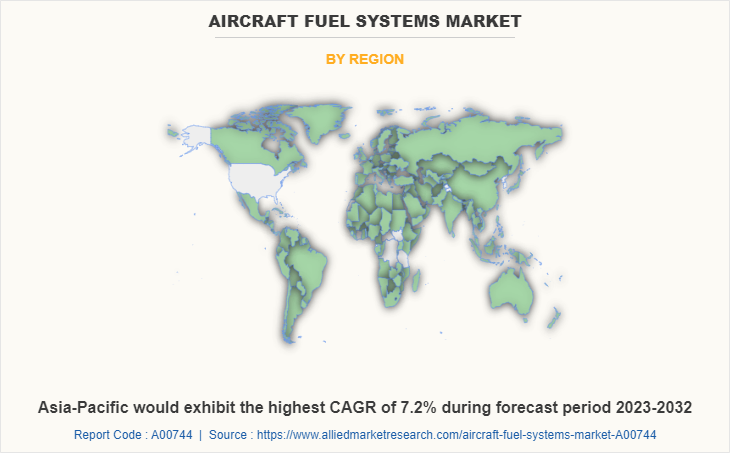
Key Benefits For Stakeholders
- This report provides a quantitative analysis of the market segments, current trends, estimations, and dynamics of the aircraft fuel systems market analysis from 2022 to 2032 to identify the prevailing aircraft fuel systems market opportunities.
- The market research is offered along with information related to key drivers, restraints, and opportunities.
- Porter's five forces analysis highlights the potency of buyers and suppliers to enable stakeholders make profit-oriented business decisions and strengthen their supplier-buyer network.
- In-depth analysis of the aircraft fuel systems market segmentation assists to determine the prevailing market opportunities.
- Major countries in each region are mapped according to their revenue contribution to the global market.
- Market player positioning facilitates benchmarking and provides a clear understanding of the present position of the market players.
- The report includes the analysis of the regional as well as global aircraft fuel systems market trends, key players, market segments, application areas, and market growth strategies.
Aircraft Fuel Systems Market Report Highlights
| Aspects | Details |
| Market Size By 2032 | USD 15.7 billion |
| Growth Rate | CAGR of 6.5% |
| Forecast period | 2022 - 2032 |
| Report Pages | 326 |
| By Application |
|
| By Engine Type |
|
| By Component |
|
| By Technology |
|
| By Region |
|
| Key Market Players | Parker Hannifin Corporation, Eaton Corporation, Secondo Mona S.p.A., Triumph Group, Inc., Crane Company, Honeywell International Inc., Woodward, Inc, Safran S.A., Collins Aerospace, GKN Aerospace Services Limited. |
The aircraft fuel systems market was valued at $8.47 billion in 2022 and is estimated to reach $15.67 billion by 2032.
The rise in adoption of hydrogen aircraft fuel system and surge in next-generation aircraft are the upcoming trends of Aircraft Fuel Systems Market.
Commercial aircraft is the leading application of Aircraft Fuel Systems Market
Asia-Pacific is the largest regional market for Aircraft Fuel Systems
Key players profiled in the report include Eaton Corporation GKN Aerospace Services Limited., Honeywell International Inc., Parker Hannifin Corporation, Collins Aerospace, Safran S.A., Triumph Group, Inc., Crane Company, Woodward, Inc., and Secondo Mona SpA.
Loading Table Of Content...
Loading Research Methodology...



